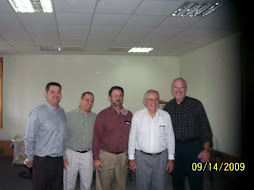 A new year always presents a challenge. There is something about the New Year period that makes most of us want to start something over again in our lives. I wonder how many people have started off in life then got messed up and failed? Most of them never start over again.
A new year always presents a challenge. There is something about the New Year period that makes most of us want to start something over again in our lives. I wonder how many people have started off in life then got messed up and failed? Most of them never start over again.Maybe today, you are sort of down and out, then you need to start over again. I am going to list four areas that are most common and that need a new beginning this coming year. If any of these speak to you or seem to challenge you, then let God make a new beginning in that area of your life.
I. SOME OF YOU NEED A NEW BEGINNING IN BIBLE READING AND STUDY
When I was younger I thought only preachers read The Bible rhrough. I remember thinking how impossible it would be in my life to accomplish that. But over time and practice, I learned that it really isn't very hard. The 1189 chapters can be read in one year by reading a little more than three chapters a day.
II. SOME OF YOU NEED A NEW BEGINNING IN YOUR MARRIAGE
There are many marriages that are just holding on. Reconstruct your marriage around the Bible, the Church, the people Of God. Most couples won’t argue and fight when they are around other Christians. Keep yourself involved with Christian fellowship.
III. SOME OF YOU NEED A NEW BEGINNING IS HELPING OTHERS
Each of us should be involved in a ministry of helping others.
A ministry of giving to others. Of giving self, money, time, kindness and our talents to God. Our congregations will never go on to the next level of growth until we each begin to giving ourselves to others.
IV. SOME OF YOU NEED A NEW BEGINNING IN YOUR LIFE
“"3Or don't you know that all of us who were baptized into Christ Jesus were baptized into his death? 4We were therefore buried with him through baptism into death in order that, just as Christ was raised from the dead through the glory of the Father, we too may live a new life. (Romans 6:3-4)
"If any man be in Christ Jesus he is a new creature.” (2 Cor. 5:17) Your live has been made over again. A new life exists.
Some Are Saying, “If only I could start over again." You can. Trust Christ.
Now is your opportunity. You can start over again today. Forgiveness is not rationed. Forgiveness is not short supply. Forgiveness is not limited. You can be forgiven of any and all sin. If you're a Christian who has fallen, confess and repent and come back to God. (1 John 1:9) If your not a Christian, give your life to Christ through faith, repentance and baptism. (Acts 2:37-28; Gal. 3:26-27)
Don’t let this year end and you still be in the same place you are right now. Do something about it. Start over again today.
Let me say finally, that you are all dear to me. I appreciate yoru reading, your comments, your emails, your encouragement more than I can say and if you will - keep coming back in 2010!!
God bless,
Robert Prater


















































